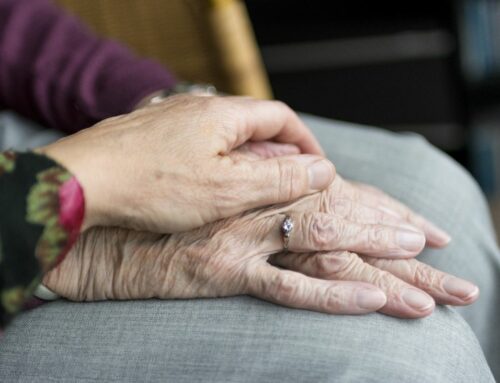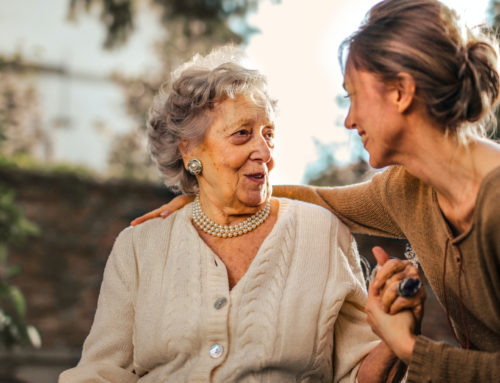“My mother is driving me crazy!” This phrase is uttered (or screamed) by caregivers everywhere who are caring for elderly parents. As if they didn’t have enough to do, caregivers often have to deal with bad behavior by their elderly parents. The AgingCare.com message boards are filled with stories of demanding elderly parents, personality changes, hallucinations, temper tantrums…even abuse. We’ve compiled the top 10 bad behaviors that elderly parents exhibit, along with some tips for coping with them.
Rage, Anger and Yelling
Age and illness can intensify longstanding personality traits in some unpleasant ways: An irritable person may become enraged, an impatient person demanding and impossible to please. Unfortunately, the person taking care of the elderly parent is often the target.
What to Do
Try to identify the cause of the anger. In most elderly individuals, behaviors are a symptom of distress. The aging process in and of itself sometimes brings about anger, as seniors vent frustration about getting old, having chronic pain, losing friends, having memory issues, being incontinent – all of the undignified things that can happen to us as we age.
In addition, Alzheimer’s disease and dementia can also cause these behaviors, in which case, your parent doesn’t have control. As a caregiver, the best thing you can do is not take it personally. Focus on the positive, ignore the negative, and take a break from caregiving when you can by finding some respite. Get some fresh air, do something you love or call a friend.
You might also want to consider calling in a home health nurse. Elders often reserve their worst behavior for those they are closest to, i.e. family members. The bad behavior might not surface in front of a stranger. And you get a much-need break.
Abusive Behavior
Sometimes, elderly parents turn on the child that is trying so hard to take care of them and the result is abuse of the caregiver. Stories of mental, emotional, even physical abuse to the adult child are all-to-common.Unless the elder has a personality disorder or mental illness, they turn on the one adult child who is showing the most love because they feel safe enough to do so. They don’t consciously abuse this son or daughter, but they are frustrated and need to vent this frustration about getting old, having chronic pain, losing a spouse and friends, having memory issues, being incontinent, etc.
What to Do
Try talking to them about how the abusive behavior makes you feel. However, many caregivers don’t get very far by talking. If the abuse is verbal or emotional, making them realize all that you do for them, by not doing it for awhile, may drive home the point that they better be nicer to you, or you will leave. Finding a little respite for yourself by getting help will allow your parent to gain a new appreciation for all you do.
If the elderly parent is physically abusing their caregiver, then professional help, be it the authorities or a counselor may need to get involved.
Not Showering
The issue of elders who were once reasonably clean refusing to take showers, wear fresh clothes and take care of personal hygiene is one that is far more common than most people think – and it’s very frustrating for caregivers.
Sometimes the issue is depression. Another factor is control. As people age, they lose more and more control over their lives. But one thing they generally can control is dressing and showers. The more they are nagged, the more they resist.
A decreased sense of sight and smell may be causing the problem. What your nose picks up as old sweat, they don’t even notice. Or, memory could be to blame. The days go by. They aren’t marked with tons of activities, there isn’t something special about Wednesday – it could be Tuesday or Thursday – they lose track of time and don’t realize how long it’s been since they showered.
Another big issue can be fear or discomfort: Fear of slipping in the tub; or embarrassment about asking for help.
What to Do
The first step is to determine why they have stopped bathing. If they have lost their sense of smell, see your doctor. Medications your parent is taking, or some unrelated disorder may be at fault for a loss of smell.
If depression is the cause, seek professional help. Therapy and medications can help. If modesty is a problem and the elder doesn’t want a family member helping her take a bath, because it’s far too intimate, they may be open to having an in-home care agency coming in for the sole purpose of a bath.
If they are afraid of the water (or sitting in the tub), there are many types of shower chairs that can help.
If the person is in a demented state and afraid of bathing, then you must move gently. Don’t insist on a shower or bath. Begin with just asking if you can wipe off the person’s face. Gradually move to under-arms and other parts of the body, talking and telling them what you are doing as you go.
Do your best to keep your parent clean. However, too much nagging is counter-productive, and at the end of the day you may have to lower your standards and definition of cleanliness.
Swearing, Offensive Language and Inappropriate Comments
When a normally loving father or mother is suddenly using the worst profanities, using offensive language or saying inappropriate things, family members are baffled as to why…and what to do about it.
We’ve heard stories about parents who used to be mild-mannered, proper, and would never utter a four-letter word suddenly cursing at their caregiver or calling them insulting names. When it happens in public, it’s embarrassing; when it happens in private it’s hurtful.
What to Do
When the behavior is out-of-character for an elder, the start of Alzheimer’s or dementia is a likely cause.
How do you deal with swearing? A couple of ideas: when a swearing tirade sets in, use distraction. Diverting your elderly parent’s attention is a simple, but effective technique. Once their mind is redirected, the swearing fit may end.
Also, try bringing up happy times from the old days. Like all people, elders love to reminisce about their lives “back in the day.” Using their long-term memory skills, the elderly parent will likely forget about whatever it is in the present that set them off. If none of this works, back off, disappear and wait for it to blow over.
Paranoia and Hallucinations
Paranoia and hallucinations in the elderly can take many forms, from accusing family members of stealing, seeing people who aren’t there or believing someone is trying to murder them.
What to Do
Sometimes hallucinations and delusions in elders are a sign of a physical illness. Keep track of what the elder is experiencing and discuss it with the doctor. It could also be a side-effect of a medication your elderly parent is taking. See your doctor, describe the symptoms and ask if your parent’s medication needs to be changed.
Oftentimes, paranoia and hallucinations are associated with Alzheimer’s disease or dementia. When this is the case, caregiving experts seem to agree: when faced with paranoia or hallucinations, the best thing to do is just relax and go with the flow. More often than not, trying to “talk them out” of a delusion won’t work. Validation is a good coping technique, because what the elder is seeing, hearing or experiencing is very real to them. Convincing them otherwise is fruitless.






